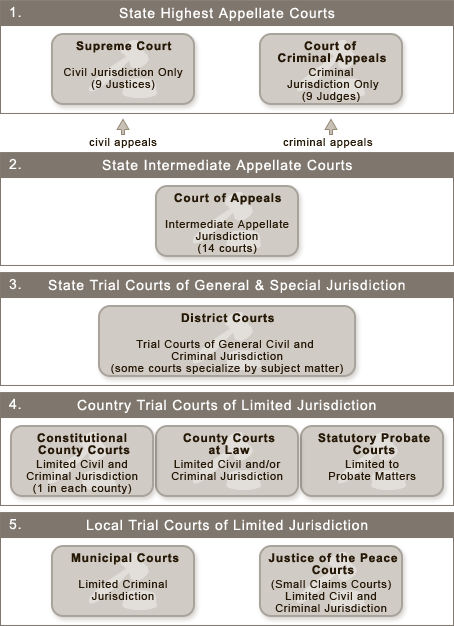A Guide to What Court Hears What Kind of Case
You’re ready to file a lawsuit! Now what? The first step is to choose where you are going to file. If you file in the wrong place, the court will have to throw out your case. A court simply cannot hear a case if it doesn’t have the jurisdiction to do so. The court might be lenient and simply move it another court, or it will dismiss the suit and you’ll have to start all over. This article will try to simplify the process so that you will be confident in your choice.
Federal or State Court?
Most likely, you will be filing in state court. But, it is useful to know why. A federal court can only hear your case when: (1) the case is a question of federal law or (2) the case involves diversity of citizenship. A question of federal law occurs when your injury and cure comes under a federal law. Examples include a federal civil rights law or suing someone over a copyright issue. Diversity of citizenship has two parts: (1) you are suing a citizen from another state or a foreign individual and (2) you are asking for at least $75,000 in damages. An example would be you (from Texas) suing an individual in Oregon for $80,000. Suing in a federal court is very tricky because you must make sure that you meet any requirements necessary to sue.
Which State Court?
Each state can decide what courts hear which cases, so each state may differ but will mostly stay the same. This article will focus on Texas’ court system. Some courts will only hear certain types of cases. These include family and probate law cases. Other courts decide what kind of case to hear based on the amount of money or type of remedy you desire.
The Supreme Court, Court of Criminal Appeals, and Court of Appeals are courts that hear cases from the lower courts. When someone files a case and then loses at court, they may want to appeal it to a higher court that may or may not rehear the case.
District Courts hear civil cases over $200, divorces, titles to land, contested elections, felony criminal cases and juvenile matters. Constitutional County Courts hear civil cases between $200 and $10,000, misdemeanor cases with a fine greater than $500 or jail time, probate cases, juvenile matters and appeals from the municipal court. County Courts of Law hear all civil, criminal, original, and appeals that law says must be heard by this court and civil cases of up to $200,000. These courts will be created by the Texas Legislature to hear certain types of cases; normally these courts hear probate cases. Statutory Probate Courts only hear probate cases. Municipal Courts hear criminal misdemeanors punished by fine only and municipal ordinance criminal cases. Justices of the Peace hear civil cases of less than $10,000 and criminal misdemeanors punished by fine only. Justices cannot do anything except grant monetary relief.
As you can see, some of the courts overlap! This makes filing a difficult process. It is easier if you are filing a case that involves a specific subject, such as family law. But when you need to figure out where to file a civil case there could be more than one option. That is why an attorney can be very helpful in the process, especially if they are knowledgeable about the court system where you reside.
– The Litigation Team
Ethan | Mark


